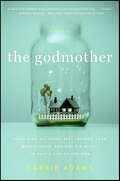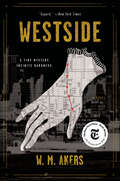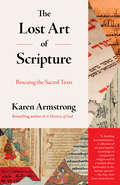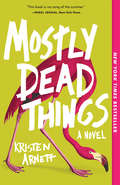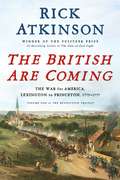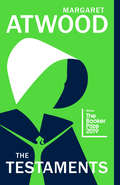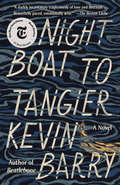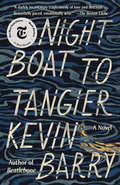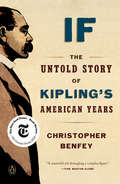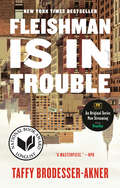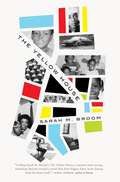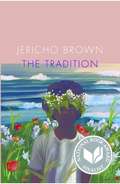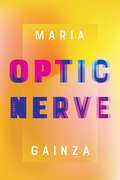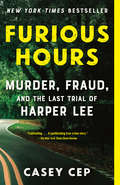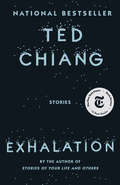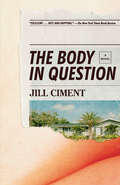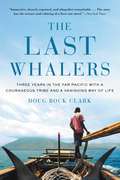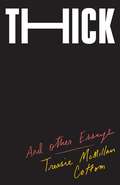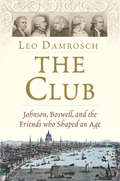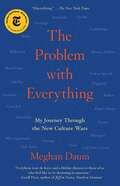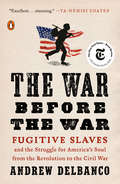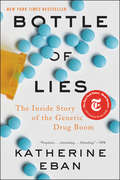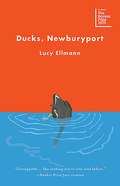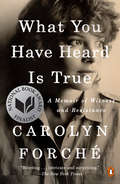Special Collections
100 Notable Books of 2019
- Table View
- List View
The Godmother
by Carrie AdamsNothing scares Tessa King more than the thought she will never have children. It doesn't matter how good her life is, and it is, it never feels good enough. She has four godchildren and dozens of friends, yet love eludes her. She knows how good a mother she could be, if only she had the chance. And then one terrible day she does, and Tessa learns firsthand that life on the other side of that white picket fence is more complicated than she ever could have imagined.Heartwarming, funny, and genuine, The Godmother speaks to anyone who has wondered about the next step and reminds us that happily-ever-after is just the beginning of the story.
Westside
by W.M. AkersA New York Times Notable Book of the Year! “The Alienist meets The City & The City in this brilliant debut that mixes fantasy and mystery. Gilda Carr’s ‘tiny mysteries’ pack a giant punch." --David Morrell, New York Times bestselling author of Murder As a Fine ArtA young detective who specializes in “tiny mysteries” finds herself at the center of a massive conspiracy in this beguiling historical fantasy set on Manhattan’s Westside—a peculiar and dangerous neighborhood home to strange magic and stranger residents—that blends the vivid atmosphere of Caleb Carr with the imaginative power of Neil Gaiman.It’s 1921, and a thirteen-mile fence running the length of Broadway splits the island of Manhattan, separating the prosperous Eastside from the Westside—an overgrown wasteland whose hostility to modern technology gives it the flavor of old New York. Thousands have disappeared here, and the respectable have fled, leaving behind the killers, thieves, poets, painters, drunks, and those too poor or desperate to leave. It is a hellish landscape, and Gilda Carr proudly calls it home. Slightly built, but with a will of iron, Gilda follows in the footsteps of her late father, a police detective turned private eye. Unlike that larger-than-life man, Gilda solves tiny mysteries: the impossible puzzles that keep us awake at night; the small riddles that destroy us; the questions that spoil marriages, ruin friendships, and curdle joy. Those tiny cases distract her from her grief, and the one impossible question she knows she can’t answer: “How did my father die?” Yet on Gilda’s Westside, tiny mysteries end in blood—even the case of a missing white leather glove. Mrs. Copeland, a well-to-do Eastside housewife, hires Gilda to find it before her irascible merchant husband learns it is gone. When Gilda witnesses Mr. Copeland’s murder at a Westside pier, she finds herself sinking into a mire of bootlegging, smuggling, corruption—and an evil too dark to face.All she wants is to find one dainty ladies’ glove. She doesn’t want to know why this merchant was on the wrong side of town—or why he was murdered in cold blood. But as she begins to see the connection between his murder, her father’s death, and the darkness plaguing the Westside, she faces the hard truth: she must save her city or die with it.Introducing a truly remarkable female detective, Westside is a mystery steeped in the supernatural and shot through with gunfights, rotgut whiskey, and sizzling Dixieland jazz. Full of dazzling color, delightful twists, and truly thrilling action, it announces the arrival of a wonderful new talent.
The Lost Art of Scripture
by Karen ArmstrongA book that shines fresh light on the world's major religions to help us build bridges between faiths and rediscover a creative and spiritual engagement with holy texts—from the New York Times bestselling author of A History of God&“[An] unusual, often dazzling, blend of theology, history, and neuroscience&” —The New YorkerThe significance of scripture may not be immediately obvious in our secular world, but its misunderstanding is perhaps the root cause of many of today's controversies. The sacred texts have been co-opted by fundamentalists, who insist that they must be taken literally, and by others who interpret scripture to bolster their own prejudices. These texts are seen to prescribe ethical norms and codes of behavior that are divinely ordained: they are believed to contain eternal truths. But as Karen Armstrong shows in this chronicle of the development and significance of major religions, such a narrow, peculiar reading of scripture is a relatively recent, modern phenomenon. For most of their history, the world's religious traditions have regarded these texts as tools that enable the individual to connect with the divine, to experience a different level of consciousness, and to help them engage with the world in more meaningful and compassionate ways.
The Lost Art of Scripture
by Karen ArmstrongIn this timely and important book, one of the world's leading commentators on religious affairs examines the lost art of Scripture as a medium to lift humanity and change our perception of reality while evading logical explanation. Today the Quran is used by some to justify war and acts of terrorism, the Torah to deny Palestinians the right to live in the Land of Israel, and the Bible to condemn homosexuality and contraception. The significance of Scripture--the holy texts at the centre of all religious traditions--may not be immediately obvious in our secular world but its misunderstanding is perhaps the root cause of most of today's controversies over religion. In this timely and important book, one of the world's leading commentators on religious affairs examines the meaning of Scripture. Today holy texts are not only used selectively to underwrite sometimes arbitrary and subjective views: they are seen to prescribe ethical norms and codes of behaviour that are divinely ordained--they are believed to contain eternal truths. But as Karen Armstrong shows in this fascinating trawl through millennia of religious history, this peculiar reading of Scripture is a relatively recent, modern phenomenon--and in many ways, a reaction to a hostile secular world. For most of their history, the world's religious traditions have regarded these texts as tools for the individual to connect with the divine, to transcend their physical existence, and to experience a higher level of consciousness that helped them to engage with the world in more meaningful and compassionate ways. Scripture was not a "truth" that had to be "believed." Armstrong argues that only if the world's religious faiths rediscover such an open and spiritual engagement with their holy texts can they curtail the arrogance, intolerance and violence that flows from a narrow reading of Scripture as truth.
Mostly Dead Things
by Kristen ArnettOne morning, Jessa-Lynn Morton walks into the family taxidermy shop to find that her father has committed suicide, right there on one of the metal tables.
Shocked and grieving, Jessa steps up to manage the failing business, while the rest of the Morton family crumbles. Her mother starts sneaking into the shop to make aggressively lewd art with the taxidermied animals. Her brother Milo withdraws, struggling to function. And Brynn, Milo’s wife—and the only person Jessa’s ever been in love with—walks out without a word.
As Jessa seeks out less-than-legal ways of generating income, her mother’s art escalates—picture a figure of her dead husband and a stuffed buffalo in an uncomfortably sexual pose—and the Mortons reach a tipping point. For the first time, Jessa has no choice but to learn who these people truly are, and ultimately how she fits alongside them.
Kristen Arnett’s debut novel is a darkly funny, heart-wrenching, and eccentric look at loss and love.
A New York Times Bestseller
The British Are Coming
by Rick AtkinsonFrom the bestselling author of the Liberation Trilogy comes the extraordinary first volume of his new trilogy about the American Revolution
Rick Atkinson, author of the Pulitzer Prize-winning An Army at Dawn and two other superb books about World War II, has long been admired for his deeply researched, stunningly vivid narrative histories. Now he turns his attention to a new war, and in the initial volume of the Revolution Trilogy he recounts the first twenty-one months of America’s violent war for independence.
From the battles at Lexington and Concord in spring 1775 to those at Trenton and Princeton in winter 1777, American militiamen and then the ragged Continental Army take on the world’s most formidable fighting force. It is a gripping saga alive with astonishing characters: Henry Knox, the former bookseller with an uncanny understanding of artillery; Nathanael Greene, the blue-eyed bumpkin who becomes a brilliant battle captain; Benjamin Franklin, the self-made man who proves to be the wiliest of diplomats; George Washington, the commander in chief who learns the difficult art of leadership when the war seems all but lost. The story is also told from the British perspective, making the mortal conflict between the redcoats and the rebels all the more compelling.
Full of riveting details and untold stories, The British Are Coming is a tale of heroes and knaves, of sacrifice and blunder, of redemption and profound suffering. Rick Atkinson has given stirring new life to the first act of our country’s creation drama.
The Testaments
by Margaret AtwoodSHORTLISTED FOR THE BOOKER PRIZE
LONGLISTED FOR THE SCOTIA
BANK GILLER PRIZE
Margaret Atwood's dystopian masterpiece, The Handmaid's Tale, has become a modern classic—and now she brings the iconic story to a dramatic conclusion in this riveting sequel.
More than fifteen years after the events of The Handmaid's Tale, the theocratic regime of the Republic of Gilead maintains its grip on power, but there are signs it is beginning to rot from within. At this crucial moment, the lives of three radically different women converge, with potentially explosive results.
Two have grown up as part of the first generation to come of age in the new order. The testimonies of these two young women are joined by a third voice: a woman who wields power through the ruthless accumulation and deployment of secrets.
As Atwood unfolds The Testaments, she opens up the innermost workings of Gilead as each woman is forced to come to terms with who she is, and how far she will go for what she believes.
Night Boat to Tangier
by Kevin BarryLONGLISTED FOR THE BOOKER PRIZEFrom the acclaimed author of the international sensations City of Bohane and Beatlebone, a striking and gorgeous new novel of two aging criminals at the butt ends of their damage-filled careers. A superbly melancholic melody of a novel full of beautiful phrases and terrible men.In the dark waiting room of the ferry terminal in the sketchy Spanish port of Algeciras, two fading Irish gangsters, Maurice Hearne and Charlie Redmond--longtime partners in the lucrative and dangerous enterprise of smuggling drugs--are waiting on the boat from Tangier, and none too patiently. It is October 23, 2018, and they are expecting Maurice's estranged daughter (or is she?), Dilly, to either arrive on a boat coming from Tangier or depart on one heading there. This nocturnal vigil will initiate an extraordinary journey back in time to excavate their shared history of violence, romance, mutual betrayals and serial exiles. Mordant and hilarious, lyrical yet laden with menace, Night Boat to Tangier is a tragicomic masterpiece rendered with the dark humour and the hardboiled Hibernian lyricism that have made multi award-winning writer Kevin Barry one of the most striking and admired fiction writers at work today.
Night Boat to Tangier
by Kevin BarryONE OF THE NEW YORK TIMES 10 BEST BOOKS OF THE YEAR • &“A darkly incantatory tragicomedy of love and betrayal ... Beautifully paced, emotionally wise.&” —The Boston GlobeIn the dark waiting room of the ferry terminal in the sketchy Spanish port of Algeciras, two aging Irishmen—Maurice Hearne and Charlie Redmond, longtime partners in the lucrative and dangerous enterprise of smuggling drugs—sit at night, none too patiently. The pair are trying to locate Maurice&’s estranged daughter, Dilly, whom they&’ve heard is either arriving on a boat coming from Tangier or departing on one heading there. This nocturnal vigil will initiate an extraordinary journey back in time to excavate their shared history of violence, romance, mutual betrayals, and serial exiles. Rendered with the dark humor and the hardboiled Hibernian lyricism that have made Kevin Barry one of the most striking and admired fiction writers at work today, Night Boat to Tangier is a superbly melancholic melody of a novel, full of beautiful phrases and terrible men.
If
by Christopher BenfeyA unique exploration of the life and work of Rudyard Kipling in Gilded Age America, from a celebrated scholar of American literature At the turn of the twentieth century, Rudyard Kipling towered over not just English literature, but the entire literary world. At the height of his fame in 1907, he was awarded the Nobel Prize for Literature, becoming its youngest winner. His influence on figures—including the likes of Freud and William James—was vast and profound. But in recent decades Kipling’s reputation has suffered a strange eclipse. Though his body of work still looms large, and his monumental poem “If—” is quoted and referenced by politicians, athletes, and professors, he himself is treated with profound unease as a man on the wrong side of history. In If, scholar Christopher Benfey brings this fascinating writer to life and, for the first time, gives full attention to his intense engagement with the United States—a rarely discussed but critical piece of evidence in our understanding of this man and his enduring legacy. Benfey traces the writer’s deep involvement with America over one crucial decade, from 1889 to 1899, when he lived for four years in Brattleboro, Vermont, and sought deliberately to turn himself into a specifically American writer. It was his most prodigious and creative period, as well as his happiest, during which he wrote The Jungle Book and Captains Courageous. Had a family dispute not forced his departure, Kipling almost certainly would have stayed. Leaving was the hardest thing he ever had to do, Kipling said. “There are only two places in the world where I want to live,” he lamented, “Bombay and Brattleboro. And I can’t live in either.” In this fresh examination of Kipling, Benfey hangs a provocative “what if” over Kipling’s American years and maps the imprint Kipling left on his adopted country as well as the imprint the country left on him. If proves there is relevance and magnificence to be found in Kipling’s work.
Fleishman Is in Trouble
by Taffy Brodesser-AknerA finely observed, timely exploration of marriage, divorce, and the bewildering dynamics of ambition from one of the most exciting writers working today
Toby Fleishman thought he knew what to expect when he and his wife of almost fifteen years separated: weekends and every other holiday with the kids, some residual bitterness, the occasional moment of tension in their co-parenting negotiations. He could not have predicted that one day, in the middle of his summer of sexual emancipation, Rachel would just drop their two children off at his place and simply not return.
He had been working so hard to find equilibrium in his single life. The winds of his optimism, long dormant, had finally begun to pick up. Now this.
As Toby tries to figure out where Rachel went, all while juggling his patients at the hospital, his never-ending parental duties, and his new app-assisted sexual popularity, his tidy narrative of the spurned husband with the too-ambitious wife is his sole consolation.
But if Toby ever wants to truly understand what happened to Rachel and what happened to his marriage, he is going to have to consider that he might not have seen things all that clearly in the first place.
A searing, utterly unvarnished debut, Fleishman Is in Trouble is an insightful, unsettling, often hilarious exploration of a culture trying to navigate the fault lines of an institution that has proven to be worthy of our great wariness and our great hope.
A New York Times Bestseller
The Yellow House
by Sarah BroomIn 1961, Sarah M. Broom's mother Ivory Mae bought a shotgun house in the then-promising neighborhood of New Orleans East and built her world inside of it. It was the height of the Space Race and the neighborhood was home to a major NASA plant--the postwar optimism seemed assured. Widowed, Ivory Mae remarried Sarah's father Simon Broom; their combined family would eventually number twelve children. But after Simon died, six months after Sarah's birth, the Yellow House would become Ivory Mae's thirteenth and most unruly child.
A book of great ambition, Sarah M. Broom's The Yellow House tells a hundred years of her family and their relationship to home in a neglected area of one of America's most mythologized cities. This is the story of a mother's struggle against a house's entropy, and that of a prodigal daughter who left home only to reckon with the pull that home exerts, even after the Yellow House was wiped off the map after Hurricane Katrina. The Yellow House expands the map of New Orleans to include the stories of its lesser known natives, guided deftly by one of its native daughters, to demonstrate how enduring drives of clan, pride, and familial love resist and defy erasure. Located in the gap between the "Big Easy" of tourist guides and the New Orleans in which Broom was raised, The Yellow House is a brilliant memoir of place, class, race, the seeping rot of inequality, and the internalized shame that often follows. It is a transformative, deeply moving story from an unparalleled new voice of startling clarity, authority, and power.
The Tradition
by Jericho BrownThe Tradition details the normalization of evil and its history at the intersection of the past and the personal. Brown’s poetic concerns are both broad and intimate, and at their very core a distillation of the incredibly human: What is safety? Who is this nation? Where does freedom truly lie? Brown makes mythical pastorals to question the terrors to which we’ve become accustomed, and to celebrate how we survive.
Optic Nerve
by Maria Gainza and Thomas BunsteadA woman searches Buenos Aires for the paintings that are her inspiration and her refuge. Her life -- she is a young mother with a complicated family -- is sometimes overwhelming. But among the canvases, often little-known works in quiet rooms, she finds clarity and a sense of who she is . . .
Furious Hours
by Casey CepAs seen on CBS Sunday Morning In Furious Hours, Casey Cep unravels the mystery surrounding Harper Lee's first and only work of nonfiction, and the shocking true crimes at the center of it. Reverend Willie Maxwell was a rural preacher accused of murdering five of his family members for insurance money in the 1970s. With the help of a savvy lawyer, he escaped justice for years until a relative shot him dead at the funeral of his last victim. Despite hundreds of witnesses, Maxwell's murderer was acquitted--thanks to the same attorney who had previously defended the Reverend. Sitting in the audience during the vigilante's trial was Harper Lee, who had traveled from New York City to her native Alabama with the idea of writing her own In Cold Blood, the true-crime classic she had helped her friend Truman Capote research seventeen years earlier. Lee spent a year in town reporting, and many more years working on her own version of the case. Now Casey Cep brings this story to life, from the shocking murders to the courtroom drama to the racial politics of the Deep South. At the same time, she offers a deeply moving portrait of one of the country's most beloved writers and her struggle with fame, success, and the mystery of artistic creativity. A New York Times Bestseller.
Exhalation
by Ted ChiangFrom the acclaimed author of Stories of Your Life and Others—the basis for the Academy Award –nominated film Arrival: a groundbreaking new collection of short fiction.
"THE UNIVERSE BEGAN AS AN ENORMOUS BREATH BEING HELD."
In these nine stunningly original, provocative, and poignant stories, Ted Chiang tackles some of humanity’s oldest questions along with new quandaries only he could imagine. In “The Merchant and the Alchemist’s Gate,” a portal through time forces a fabric seller in ancient Baghdad to grapple with past mistakes and second chances.
In “Exhalation,” an alien scientist makes a shocking discovery with ramifications that are literally universal. In “Anxiety Is the Dizziness of Freedom,” the ability to glimpse into alternate universes necessitates a radically new examination of the concepts of choice and free will.
Including stories being published for the first time as well as some of his rare and classic uncollected work, Exhalation is Ted Chiang at his best: profound, sympathetic—revelatory.
A New York Times Bestseller
The Body in Question
by Jill CimentFrom the author of Heroic Measures (“Smart and funny and completely surprising . . . I loved every page” —Ann Patchett), Act of God (“A feat of literary magic”—Booklist) and, with Amy Hempel, The Hand That Feeds You (“An unnerving, elegant page-turner” —Vanity Fair), a spare, masterful novel.
The place: central Florida. The situation: a sensational murder trial, set in a courthouse more Soviet than Le Corbusier; a rich, white teenage girl—a twin—on trial for murdering her toddler brother.
Two of the jurors: Hannah, a married fifty-two-year-old former Rolling Stone and Interview Magazine photographer of rock stars and socialites (she began to photograph animals when she realized she saw people “as a species”), and Graham, a forty-one-year-old anatomy professor. Both are sequestered (she, juror C-2; he, F-17) along with the other jurors at the Econo Lodge off I-75.
As the shocking and numbing details of the crime are revealed during a string of days and courtroom hours, and the nights play out in a series of court-financed meals at Outback Steak House (the state isn’t paying for their drinks) and Red Lobster, Hannah and Graham fall into a furtive affair, keeping their oath as jurors never to discuss the trial.
During deliberations the lovers learn that they are on opposing sides of the case. Suddenly they look at one another through an altogether different lens, as things become more complicated . . .
After the verdict, Hannah returns home to her much older husband, but the case ignites once again and Hannah’s “one last dalliance before she is too old” takes on profoundly personal and moral consequences as The Body in Question moves to its affecting, powerful, and surprising conclusion.
The Last Whalers
by Doug Bock ClarkOn a volcanic island in the Savu Sea so remote that other Indonesians call it "The Land Left Behind" live the Lamalerans: a tribe of 1,500 hunter-gatherers who are the world's last subsistence whalers. They have survived for half a millennium by hunting whales with bamboo harpoons and handmade wooden boats powered by sails of woven palm fronds.
But now, under assault from the rapacious fores of the modern era and a global economy, their way of life teeters on the brink of collapse.
Award-winning journalist Doug Bock Clark, one of a handful of Westerners who speak the Lamaleran language, lived with the tribe across three years, and he brings their world and their people to vivid life in this gripping story of a vanishing culture. Jon, an orphaned apprentice whaler, toils to earn his harpoon and provide for his ailing grandparents, while Ika, his indomitable younger sister, is eager to forge a life unconstrained by tradition, and to realize a star-crossed love. Frans, an aging shaman, tries to unite the tribe in order to undo a deadly curse. And Ignatius, a legendary harpooner entering retirement, labors to hand down the Ways of the Ancestors to his son, Ben, who would secretly rather become a DJ in the distant tourist mecca of Bali.
Deeply empathetic and richly reported, The Last Whalers is a riveting, powerful chronicle of the collision between one of the planet's dwindling indigenous peoples and the irresistible enticements and upheavals of a rapidly transforming world.
Thick
by Tressie McMillan CottomIn eight highly praised treatises on beauty, media, money, and more, Tressie McMillan Cottom—award-winning professor and acclaimed author of Lower Ed—is unapologetically “thick”: deemed “thick where I should have been thin, more where I should have been less,” McMillan Cottom refuses to shy away from blending the personal with the political, from bringing her full self and voice to the fore of her analytical work. Thick “transforms narrative moments into analyses of whiteness, black misogyny, and status-signaling as means of survival for black women” (Los Angeles Review of Books) with “writing that is as deft as it is amusing” (Darnell L. Moore).
This “transgressive, provocative, and brilliant” (Roxane Gay) collection cements McMillan Cottom’s position as a public thinker capable of shedding new light on what the “personal essay” can do. She turns her chosen form into a showcase for her critical dexterity, investigating everything from Saturday Night Live, LinkedIn, and BBQ Becky to sexual violence, infant mortality, and Trump rallies.
Collected in an indispensable volume that speaks to the everywoman and the erudite alike, these unforgettable essays never fail to be “painfully honest and gloriously affirming” and hold “a mirror to your soul and to that of America” (Dorothy Roberts).
The Club
by Leo DamroschPrize-winning biographer Leo Damrosch tells the story of “the Club,” a group of extraordinary writers, artists, and thinkers who gathered weekly at a London tavern In 1763, the painter Joshua Reynolds proposed to his friend Samuel Johnson that they invite a few friends to join them every Friday at the Turk’s Head Tavern in London to dine, drink, and talk until midnight. Eventually the group came to include among its members Edmund Burke, Adam Smith, Edward Gibbon, and James Boswell. It was known simply as “the Club.” In this captivating book, Leo Damrosch brings alive a brilliant, competitive, and eccentric cast of characters. With the friendship of the “odd couple” Samuel Johnson and James Boswell at the heart of his narrative, Damrosch conjures up the precarious, exciting, and often brutal world of late eighteenth†‘century Britain. This is the story of an extraordinary group of people whose ideas helped to shape their age, and our own.
The Problem with Everything
by Meghan Daum&“[A]ffectingly personal, achingly earnest, and something close to necessary.&” —Vogue &“Personal, convincing, unflinching.&” —Tablet From an author who&’s been called &“one of the most emotionally exacting, mercilessly candid, deeply funny, and intellectually rigorous writers of our time&” (Cheryl Strayed, #1 New York Times bestselling author) comes a seminal book that reaches surprising truths about feminism, the Trump era, and the Resistance movement. You won&’t be able to stop thinking and talking about it.In this gripping work, Meghan Daum examines our country&’s most intractable problems with clear-eyed honesty instead of exaggerated outrage. With passion, humor, and personal reflection, she tries to make sense of the current landscape—from Donald Trump&’s presidency to the #MeToo movement and beyond. In the process, she wades into the waters of identity politics and intersectionality, thinks deeply about campus politics and notions of personal resilience, and tests a theory about the divide between Gen Xers and millennials. This signature work may well be the first book to capture the essence of this era in all its nuances and contradictions. No matter where you stand on its issues, this book will strike a chord.
The War Before the War
by Andrew DelbancoThe devastating story of how fugitive slaves drove the nation to Civil War
For decades after its founding, America was really two nations--one slave, one free. There were many reasons why this composite nation ultimately broke apart, but the fact that enslaved black people repeatedly risked their lives to flee their masters in the South in search of freedom in the North proved that the "united" states was actually a lie.
Fugitive slaves exposed the contradiction between the myth that slavery was a benign institution and the reality that a nation based on the principle of human equality was in fact a prison-house in which millions of Americans had no rights at all. By awakening northerners to the true nature of slavery, and by enraging southerners who demanded the return of their human "property," fugitive slaves forced the nation to confront the truth about itself.
By 1850, with America on the verge of collapse, Congress reached what it hoped was a solution-- the notorious Compromise of 1850, which required that fugitive slaves be returned to their masters. Like so many political compromises before and since, it was a deal by which white Americans tried to advance their interests at the expense of black Americans.
Yet the Fugitive Slave Act, intended to preserve the Union, in fact set the nation on the path to civil war. It divided not only the American nation, but also the hearts and minds of Americans who struggled with the timeless problem of when to submit to an unjust law and when to resist. The fugitive slave story illuminates what brought us to war with ourselves and the terrible legacies of slavery that are with us still.
Bottle of Lies
by Katherine EbanFrom an award-winning journalist, an explosive narrative investigation of the generic drug boom that reveals fraud and life-threatening dangers on a global scale—The Jungle for pharmaceuticalsMany have hailed the widespread use of generic drugs as one of the most important public-health developments of the twenty-first century. Today, almost 90 percent of our pharmaceutical market is comprised of generics, the majority of which are manufactured overseas. We have been reassured by our doctors, our pharmacists and our regulators that generic drugs are identical to their brand-name counterparts, just less expensive. But is this really true?Katherine Eban’s Bottle of Lies exposes the deceit behind generic-drug manufacturing—and the attendant risks for global health. Drawing on exclusive accounts from whistleblowers and regulators, as well as thousands of pages of confidential FDA documents, Eban reveals an industry where fraud is rampant, companies routinely falsify data, and executives circumvent almost every principle of safe manufacturing to minimize cost and maximize profit, confident in their ability to fool inspectors. Meanwhile, patients unwittingly consume medicine with unpredictable and dangerous effects.The story of generic drugs is truly global. It connects middle America to China, India, sub-Saharan Africa and Brazil, and represents the ultimate litmus test of globalization: what are the risks of moving drug manufacturing offshore, and are they worth the savings? A decade-long investigation with international sweep, high-stakes brinkmanship and big money at its core, Bottle of Lies reveals how the world’s greatest public-health innovation has become one of its most astonishing swindles.
Ducks, Newburyport
by Lucy EllmannBaking a multitude of tartes tatins for local restaurants, an Ohio housewife contemplates her four kids, husband, cats and chickens. Also, America's ignoble past, and her own regrets. She is surrounded by dead lakes, fake facts, Open Carry maniacs, and oodles of online advice about survivalism, veil toss duties, and how to be more like Jane Fonda. But what do you do when you keep stepping on your son's toy tractors, your life depends on stolen land and broken treaties, and nobody helps you when you get a flat tire on the interstate, not even the Abominable Snowman? When are you allowed to start swearing?
With a torrent of consciousness and an intoxicating coziness, Ducks, Newburyport lays out a whole world for you to tramp around in, by turns frightening and funny. A heart-rending indictment of America's barbarity, and a lament for the way we are blundering into environmental disaster, this book is both heresy--and a revolution in the novel.
What You Have Heard Is True
by Carolyn ForchéThe powerful story of a young poet who becomes an activist through a trial by fireWhat You Have Heard is True is a devastating, lyrical, and visionary memoir about a young woman's brave choice to engage with horror in order to help others. Written by one of the most gifted poets of her generation, this is the story of a woman's radical act of empathy, and her fateful encounter with an intriguing man who changes the course of her life.
Carolyn Forché is twenty-seven when the mysterious stranger appears on her doorstep. The relative of a friend, he is a charming polymath with a mind as seemingly disordered as it is brilliant.
She's heard rumors from her friend about who he might be: a lone wolf, a communist, a CIA operative, a sharpshooter, a revolutionary, a small coffee farmer, but according to her, no one seemed to know for certain.
He has driven from El Salvador to invite Forché to visit and learn about his country. Captivated for reasons she doesn't fully understand, she accepts and becomes enmeshed in something beyond her comprehension.
Together they meet with high-ranking military officers, impoverished farm workers, and clergy desperately trying to assist the poor and keep the peace. These encounters are a part of his plan to educate her, but also to learn for himself just how close the country is to war.
As priests and farm-workers are murdered and protest marches attacked, he is determined to save his country, and Forché is swept up in his work and in the lives of his friends.
Pursued by death squads and sheltering in safe houses, the two forge a rich friendship, as she attempts to make sense of what she's experiencing and establish a moral foothold amidst profound suffering. This is the powerful story of a poet's experience in a country on the verge of war, and a journey toward social conscience in a perilous time.
